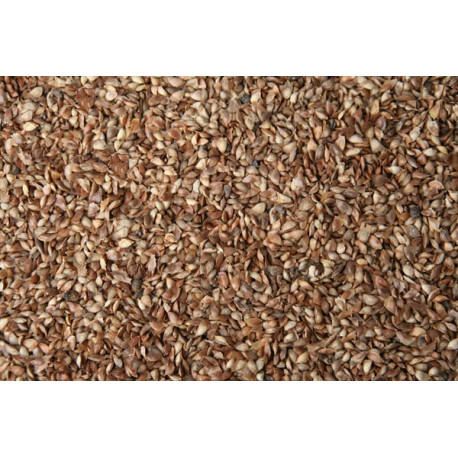- New




Reference: 166903
Properties of Pine or Larix seeds.
Anti-inflammatory, analgesic, antispasmodic,
Antiseptic, anti-infectious (pneumococci),
Decongestant of the small pelvis and prostate,
Diuretic
Expectorant, tonic for the respiratory organs.
Properties of Pine or Larix seeds.
Anti-inflammatory, analgesic, antispasmodic,
Antiseptic, anti-infectious (pneumococci),
Decongestant of the small pelvis and prostate,
Diuretic
Expectorant, tonic for the respiratory organs.
The milk thistle seed has hepatoprotective properties. It is therefore excellent for our birds to prevent liver problems.
Yellow millet is rich in vitamins and minerals and is an alkaline (non-acidic) cereal. It is part of the basic diet of parakeets, exotic birds and exotic doves.
Millet contains magnesium, phosphorus, iron, potassium, manganese, vitamin A, vitamin B1, vitamin B2, vitamin PP (nicotinic acid) and vitamin B5.
Cedar nuts contain approximately 55% of valuable unsaturated fatty acids, particularly linoleic and alpha-linolenic acid, as well as the rare pinoleic/pinolenic acid. They are rich in tocopherols (vitamin E) as antioxidants and high-quality proteins (approx. 17%). They also contain numerous minerals (including magnesium, potassium, phosphorus), trace elements (copper, manganese, zinc), vitamins (K and B), and flavonoids.
Millet contains magnesium, phosphorus, iron, potassium, manganese, vitamin A, vitamin B1, vitamin B2, vitamin PP (nicotinic acid) and vitamin B5.
Dimensions: 20kg
Chia is a sage. It is an annual plant that can grow up to 1 m tall and whose scientific name is Salvia hispanica.
The composition of chia seeds is closely related to that of other mucilaginous seeds such as flaxseed and psyllium. Unlike flaxseed, however, chia does not present anti-nutritional factors, factors that limit the use of flaxseed without prior heat treatment. Anti-nutritional factors are cyanogenic glucosides or linatins, inhibitors of vitamin B6 that prevent its action. Chia also has a much more pleasant taste than flaxseed and is more likely to be eaten by birds.
Spinach seeds contain vitamins A, B1, B2, B3, B7, B9 and C, mineral salts and trace elements. Regular consumption helps to strengthen the feathers.
Basil 1kg
Basil contains many antioxidants, is anti-inflammatory, and helps against stress. This does not mean that basil is considered a medicine. Dried basil is of course also different from fresh basil plants. But the fact remains: basil is good for health.
Niger, bird seeds rich in phosphorus and calcium. Niger seeds (or nyjer seeds) are fine seeds rich in oil. They come from the Guizotia abyssinica (also known as Guizotia oleifera). Niger is highly favoured by most birds, with goldfinches and siskins being particularly fond of them.
Niger is one of the few bird seeds with a good calcium/phosphorus ratio.
Dari, also known as sorghum, millet, is a variety of seeds that is attached to millet varieties. The dari has the size of the hemp seed. The seed is native to the warm regions of Australia, Asia, Africa and South America. There are three varieties: white, yellow and red-brown dari. It should be noted that light dari is given more value than red-brown dari. As far as the food value in particular is concerned, there is not the slightest difference. In addition, the red-brown dari is well appreciated by agapornis. Dari can be compared to wheat in terms of starch content. The seed has a favorable composition of amino acids. The protein present in the dari has a particularly high leucine content.
Properties of Pine or Larix seeds.
Anti-inflammatory, analgesic, antispasmodic,
Antiseptic, anti-infectious (pneumococci),
Decongestant of the small pelvis and prostate,
Diuretic
Expectorant, tonic for the respiratory organs.
Spinach seeds contain vitamins A, B1, B2, B3, B7, B9 and C, mineral salts and trace elements. Regular consumption helps to strengthen the feathers.
Chicory seeds (cichorium intybus) are part of the health seeds that come from wild plants. These seeds are rich in fibres and minerals and promote intestinal balance.
They purify the body and are also effective in cases of indigestion.
Seeds for canaries and exotic and indigenous birds.
Chia is a sage. It is an annual plant that can reach 1 m in height, and its scientific name is Salvia hispanica.
The composition of the chia seed closely resembles that of other mucilaginous seeds like flaxseed and psyllium. Unlike flaxseed, chia does not have anti-nutritional factors, which limit the use of flaxseed without prior heat treatment. The anti-nutritional factors are cyanogenic glycosides or linatins, inhibitors of vitamin B6 that prevent its action. Chia also has a much more pleasant taste than flaxseed, and birds are more willing to consume it.
Clover stimulates the immune system and slows down cellular ageing through its excellent antioxidant properties. Rich in vitamins B, C, E and provitamin A.

Properties of Pine or Larix seeds.
Anti-inflammatory, analgesic, antispasmodic,
Antiseptic, anti-infectious (pneumococci),
Decongestant of the small pelvis and prostate,
Diuretic
Expectorant, tonic for the respiratory organs.
